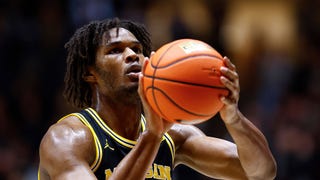
Simone Biles stretches during practice for the U.S. Gymnastics Championships Wednesday, Aug. 7, 2019, in Kansas City, Mo. (AP Photo/Charlie Riedel)
The mix of rage, disappointment and grief are still there. Just under the surface.
And while Simone Biles tries to stay focused on the healing process more than 18 months after the Olympic gymnastics champion revealed she was among the hundreds of athletes abused by disgraced sports doctor Larry Nassar, there are times when the massive systemic breakdown that allowed Nassar's behavior to run unchecked for years becomes too much.
"It hits you like a train wreck," Biles said Wednesday as she prepared for the U.S. championships.
One that leaves the greatest gymnast of her generation and the face of the U.S. Olympic movement ahead of the 2020 Games in a difficult spot.
She still loves competing, pushing herself and the boundaries of her sport in the process.
And yet the 22-year-old still finds herself working under the banner of USA Gymnastics and by extension the U.S. Olympic and Paralympic Committee. Both organizations were called out by Congress along with the FBI last week in a scathing report that detailed a series of catastrophic missteps that allowed Nassar — a longtime trainer with USA Gymnastics as well as Michigan State University — to continue to abuse patients even after athletes started questioning his methods in the summer of 2015.
While Nassar is now behind bars for the rest of his life and USA Gymnastics has undergone a massive overhaul in leadership since the 2016 Olympics as it fights to retain its status as the sport's national governing body, the scars remain fresh for Biles, though she knows that doesn't make her different from the other women who were abused by Nassar under the guise of treatment.
"I don't mean to cry," the typically poised Biles said through tears two days before attempting to win her sixth national title. "But it's hard coming here for an organization having had them failed us so many times. And we had one goal and we've done everything that they've asked us for, even when we didn't want to and they couldn't do one damn job. You had one job. You literally had one job and you couldn't protect us."
Biles is in therapy to help deal with the emotional fallout, well aware that progress will be slow and that a full recovery might not be possible.
"Everyone's healing process is different and I think that's the hardest part," she said. "Because I feel like maybe I should be healed or this or that. But I feel like it will be an open wound for a really long time and it might not ever get closed or healed."
So Biles is doing what she can, trying to find a balance between her pursuit to become the first woman in more than 50 years to repeat as Olympic champion while using her status as the face of her sport to effect change.
"When we tweet, it obviously goes a long way," she said. "We're blessed to be given a platform so that people will hear and listen. But you know, it's not easy coming back to the sport. Coming back to the organization that has failed you. But you know, at this point, I just try to think, 'I'm here as a professional athlete with my club team and stuff like that.' Because it's not easy being out here. I feel every day is a reminder of what I went through and what I've been through and what I'm going through and how I've come out of it."
The process in some ways is getting easier. There were days early in her return to training in the fall and winter of 2017 and early 2018 when she would quit in the middle of practice and walk out of the gym without a word to coaches Cecile and Laurent Landi as to why.
Those days are gone. Biles says therapy has helped her rediscover her joy for the sport she is redefining at every meet.
Still, the effects of her experience with Nassar, combined with the inability of USA Gymnastics, the USOPC and the FBI to act decisively when athletes alerted them about his conduct, linger. She can feel it when she is introduced to a new staff member at USA Gymnastics and sense it in her reluctance to meet with trainers after practice.
"How can we trust them?" Biles said. "They bring in new people all the time and I automatically put my foot up because the people that I had known for years had failed us."
Asked if she's optimistic that USA Gymnastics — which is on its fourth president and CEO since March 2017 and filed for bankruptcy last fall in an effort to halt the decertification process — can find a way forward, Biles shrugged.
Yes, the organization has taken several steps in addressing what it acknowledges was a toxic culture that played a role in Nassar hiding in plain sight, including updating its Safe Sport policy to provide better protection for athletes and clearer guidelines for coaches, parents, trainers and club owners on what constitutes abuse.
Yet Biles is wary. She has watched for the last three years as every step forward by USA Gymnastics is met with a step backward. Biles is intent on making sure she leaves gymnastics in a better place. She hopes the organization she competes for is sincere in its attempts to do the same.
For now, she doesn't sound convinced.
"All we can do at this point is have faith that they'll have our backs, they'll do the right thing," she said. "But at the end of the day it's just a ticking time bomb. We'll see. It's a waiting game."







































